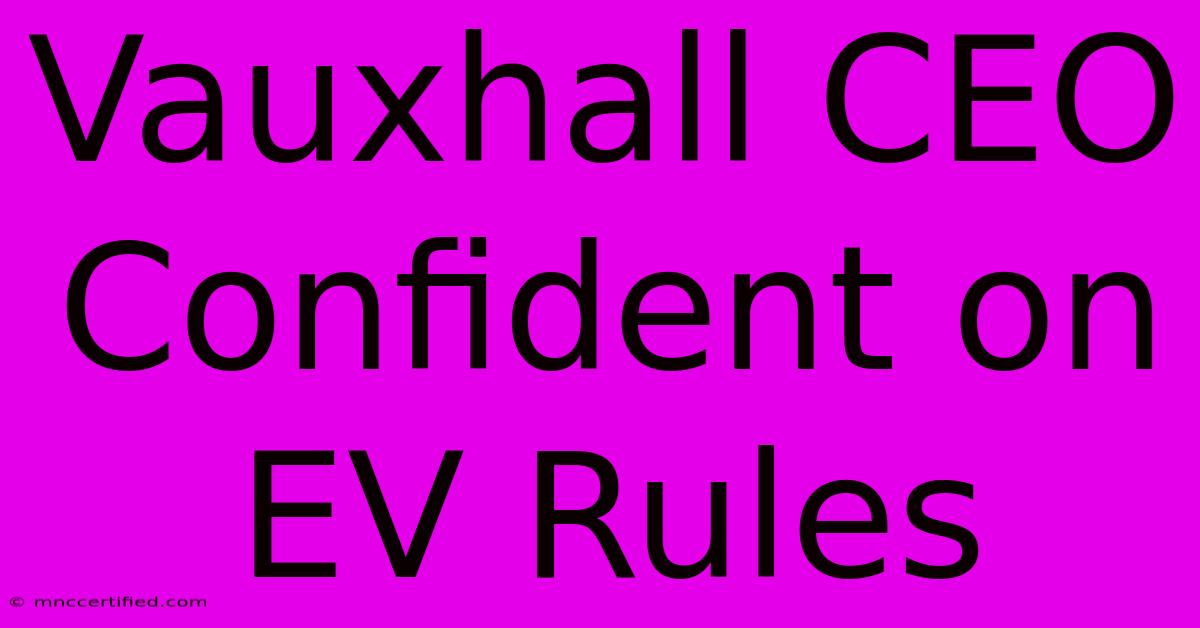Vauxhall CEO Confident On EV Rules

Table of Contents
Vauxhall CEO Confident on EV Rules: Navigating the UK's Electrification Drive
The UK's ambitious push towards electric vehicles (EVs) is reshaping the automotive landscape, and Vauxhall, a key player in the British market, is embracing the challenge. Vauxhall's CEO has recently expressed unwavering confidence in the company's ability to navigate the increasingly stringent EV regulations. This article delves into the CEO's statements, analyzing the implications for Vauxhall, the wider automotive industry, and the UK's electrification goals.
Navigating the Shifting Sands of EV Regulations
The UK government has set ambitious targets for EV adoption, including a ban on the sale of new petrol and diesel cars by 2030. This aggressive timeline presents significant hurdles for automakers, requiring substantial investment in EV technology, infrastructure, and marketing. Vauxhall, like other manufacturers, faces the pressure to adapt quickly and effectively.
The CEO's confidence stems from several factors, including:
Vauxhall's Electrification Strategy
Vauxhall has already begun a significant transition to electric vehicles. Their strategy involves:
- Investing heavily in EV models: Vauxhall is expanding its range of electric and hybrid vehicles, offering consumers a wider selection to meet diverse needs and budgets.
- Developing charging infrastructure: Recognizing the importance of accessible charging, Vauxhall is actively involved in promoting and supporting the growth of the UK's charging network.
- Focusing on affordability: The CEO's confidence also suggests a strategy focused on making EVs accessible to a broader range of consumers, addressing concerns about the higher initial cost of electric vehicles compared to petrol or diesel alternatives.
Government Support and Incentives
The UK government's commitment to supporting the EV transition through grants, tax incentives, and investment in infrastructure provides a crucial tailwind for Vauxhall and the wider industry. This support mitigates some of the risks associated with the transition.
Consumer Demand and Market Trends
Growing consumer awareness of environmental issues and the increasing availability of affordable EVs are driving market demand. This positive market trend gives Vauxhall confidence in the future of its electrification strategy.
Challenges Remain: Addressing Concerns
Despite the CEO's optimism, challenges remain:
- Supply Chain Disruptions: The global automotive industry is grappling with supply chain disruptions, impacting the production and availability of EV components.
- Charging Infrastructure Gaps: While the UK's charging network is expanding, gaps remain, particularly in rural areas. Addressing this infrastructure deficit is critical for widespread EV adoption.
- Consumer Affordability: While EVs are becoming more affordable, the initial purchase price remains a barrier for many potential buyers. Innovative financing options and continued government support are crucial.
The Wider Implications for the UK Automotive Industry
Vauxhall's experience reflects the broader challenges and opportunities facing the UK automotive industry as it navigates the transition to electric vehicles. The success of Vauxhall's strategy will be a significant indicator for the overall health and competitiveness of the UK automotive sector in the global EV market. The company’s confidence signals a proactive approach to meeting the future head-on.
Conclusion: A Confident Outlook, But Vigilance Remains Key
Vauxhall's CEO's confidence in meeting the UK's EV regulations reflects a proactive strategy focused on investment, innovation, and market adaptation. However, challenges related to supply chains, infrastructure, and affordability must be addressed to ensure a smooth and successful transition. The coming years will be crucial in determining the effectiveness of the strategy and its impact on Vauxhall's position within the evolving UK automotive landscape. The industry, and the UK as a whole, are watching closely.

Thank you for visiting our website wich cover about Vauxhall CEO Confident On EV Rules. We hope the information provided has been useful to you. Feel free to contact us if you have any questions or need further assistance. See you next time and dont miss to bookmark.
Featured Posts
-
Global Energy Trading Platform
Nov 28, 2024
-
Real Estate Investment Phoenix
Nov 28, 2024
-
Mishal Husains Bbc Departure Confirmed
Nov 28, 2024
-
Vauxhall Luton Factory Closure Confirmed
Nov 28, 2024
-
Devlins Response To Mc Gregor Accusations
Nov 28, 2024